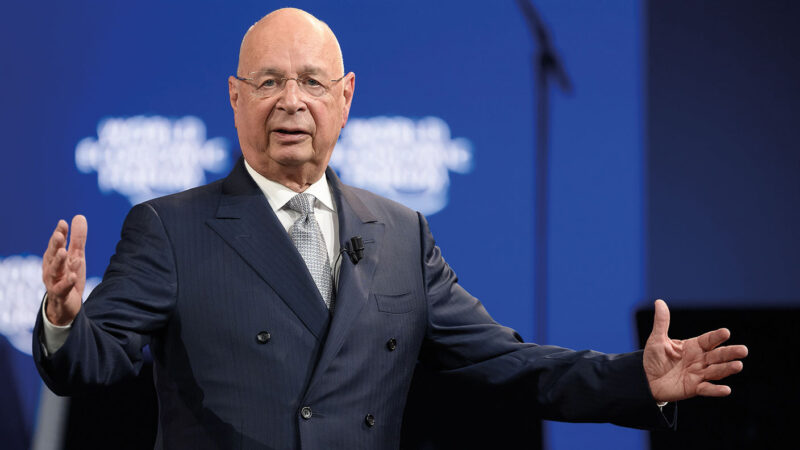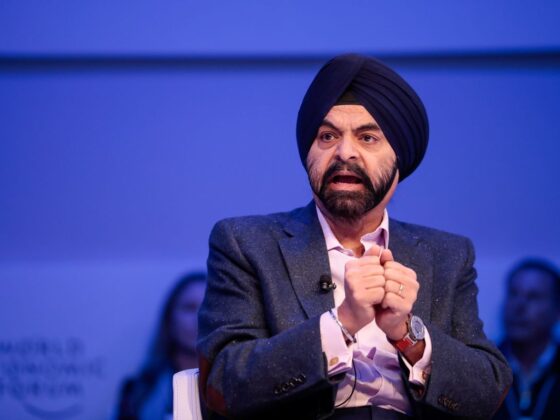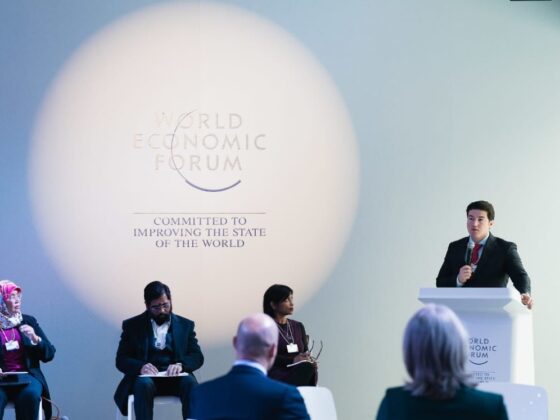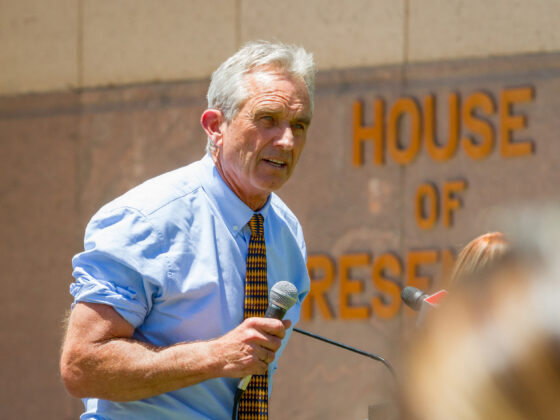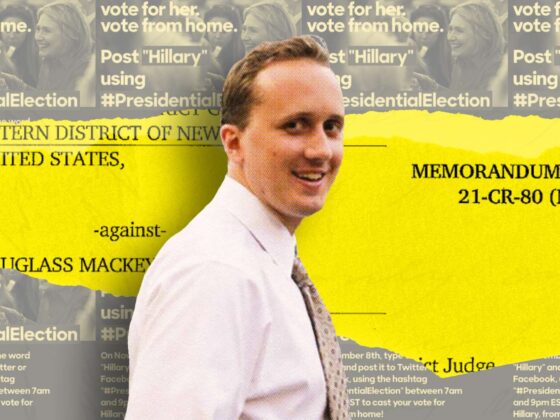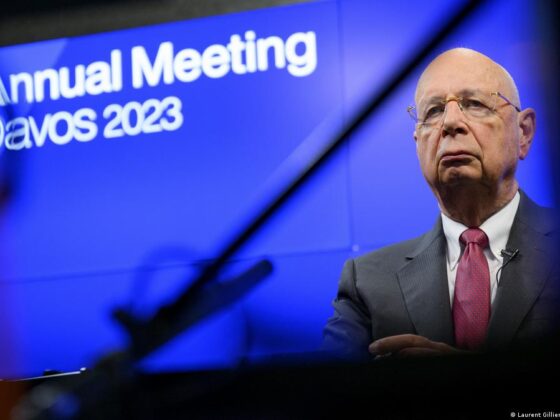Covid-19: The Great Reset is Klaus Schwab’s more or less well-known book that envisions and paraphrases a lot of the madness we see in the world today, and is often referred to as a ‘manual for the Great Reset.’
On about 100 pages you torture yourself through the globalist brain vapors of the executive floor, and at the end you may probably call yourself an intellectual if you understood the nonsense you just read. Since this is incredibly boring, and you can hardly ask a society that no longer reads books anyway to read through anything that dry and boring, I read it for you and will express my enthusiasm in the following text.
If you do want to read it, you can do so for free here.
In COVID-19: The Great Reset, there are misleading data, sophistry from the usual suspects, circular references to false-flag events, straw-man arguments, ad hominem attacks, and unwillingness to address obvious issue areas. In an effort to prove their assertion that every apparent problem in the world can be resolved with the right and centralized solution, which is eventually your acceptance of a drugged and caged-in life, the writers attempt to use the pandemic to justify their twisted plans for your lives.
With such disclaimers in place and by “reading around” the outright propaganda, perhaps we might find anything of interest in Mr. Schwab’s infamous book. According to the author, it’s not quite a book but more an essay. I will refrain from slamming the reader with the blatant rubbish as much as possible, since this article is intended for the informed reader.
After a short introduction the authors rapidly transition to the book’s main theme of “transformation” since they presuppose that you already believe the coronavirus tale to be true.
“But deep, existential crises also favour introspection and can harbour the potential for transformation. The fault lines of the world—most notably social divides, lack of fairness, absence of cooperation, failure of global governance and leadership—now lie exposed as never before, and people feel the time for reinvention has come. A new world will emerge, the contours of which are for us to both imagine and to draw.”
A daring new executive-suite program that all good troops must support will be recognized as bombast by those who have experience in the corporate business world. Of course, that same bold new initiative coincidentally gets rolled out in every Fortune 500 company. The “fault lines” the authors are referring to are the results of the numerous government initiatives that have been carried out over the years. The “deep, existential dilemmas” that Schwab and Malleret are wringing their hands over are therefore not at all existential. They don’t exist. Because the qualifying requirement was not met, a detailed study of the aforementioned remark revealed that everything that follows the first sentence is based on a deception.
Existential refers to the reality and existence of something. Since they are founded on made-up events and propaganda, manufactured crises are categorically not existential. The intended results are real, but their underlying assumptions are not. The word existential appears frequently in the essay; this blip on our radar should alert us to take notice because it typically indicates that a deception is being told.
I know about existential being used as describing the threat something imposes on the existence of something but there are several contexts in the book where this interpretation makes absolutely no sense, which of course may be due to the fact that the book is badly written.
We learn about terrible earlier pandemics throughout history and the various quarantine measures that were taken, just to make sure that you understand that they were doing nothing new or unlawful. The writers include a few accounts of how Jews were held responsible and subjected to suffering. It doesn’t add to the subject, but it’s always good to ensure the reader that your motivations aren’t anti-Semitic at all, and you are the good guy. Though, to sell it to woke college students, they may want to rewrite it to add “people of color”.
However, the authors discover a bright spot in the dark pandemic skies:
“The Black Death may have been the unrecognized beginning of modern man. If such profound social, political, and economic change could be provoked by the plague in the medieval world, could the COVID-19 pandemic mark the onset of a similar turning point with long-lasting and dramatic consequences for our world today? Unlike certain past epidemics, COVID-19 doesn’t pose a new existential threat. It will not result in unforeseen mass famines or major military defeats and regime changes. Whole populations will neither be exterminated nor displaced as a result of the pandemic.”
There is a discord here. It was initially existential, but is no longer so. After discussing the staggering death tolls of earlier pandemics and how COVID-19 is not at all comparable to those pandemics, the authors express optimism for effects as transformative as the bubonic plagues. On what basis could it possibly be? The drivers are distinct. The only resemblance between the two is that the coronavirus has been falsely labeled a pandemic. The WEF authors state categorically that the coronavirus pandemic lacks existential significance, i.e., that it is a hoax.
They must be expecting you won’t recognize the term and will thus ignore it. This statement may be overstated, but it is meaningful in the context of the article we are examining. Schwab and Malleret are executives at the WEF. Schwab established it. This misinformation emanates from the beast’s stomach. In this same moment, they inform us that the coronavirus epidemic is a hoax. The whole COVID-19 initiative is based on an admittedly fraudulent concept.
In this drama, COVID-19 serves only as a foil for the main character, ‘change’. Schwab and Malleret hope that you will not comprehend what is being stated and will be carried away by the hope-and-change product they are marketing. And they would nearly always be true in their prediction. They divert the public’s attention to tangential topics that, when distilled down, are all about surrendering to a police regime in which everyone is routinely vaccinated and surveilled(albeit not quite in those words).
SECTION 1.1.1—INTERDEPENDENCE
“The 7 billion people who inhabit planet earth no longer live in more than one hundred separate boats (countries). Instead, they all live in 193 separate cabins on the same boat.”
How poetic. But Mr. Mahbubani did not stop there. He offered a fresh and on cue boat comparison in 2020 as well:
“If we 7.5 billion people are now stuck together on a virus-infected cruise ship, does it make sense to clean and scrub only our personal cabins while ignoring the corridors and air wells outside, through which the virus travels? The answer is clearly: no. Yet, this is what we have been doing…since we are now in the same boat, humanity has to take care of the global boat as a whole.”
Other than Mahbubani’s passion for boats, there are a few points worth noting here. This straw-man analogy with its sole governor-friendly solution (“humanity” = governors) did not consider that the crew of this ship could have been taking care of the common spaces. More intriguing to consider is that from the news media we have visceral images in our memory of cruise ships allegedly dead-in-the-water with disgusting health and hygiene problems, complete with video footage. This whole analogy and the toxic cruise ship meme throw up a stink.
We are presented with a graphic from the WEF Global Risks Report 2020 that several hundreds of obviously negative “problems.” It purports to clearly demonstrate how these issues are related.
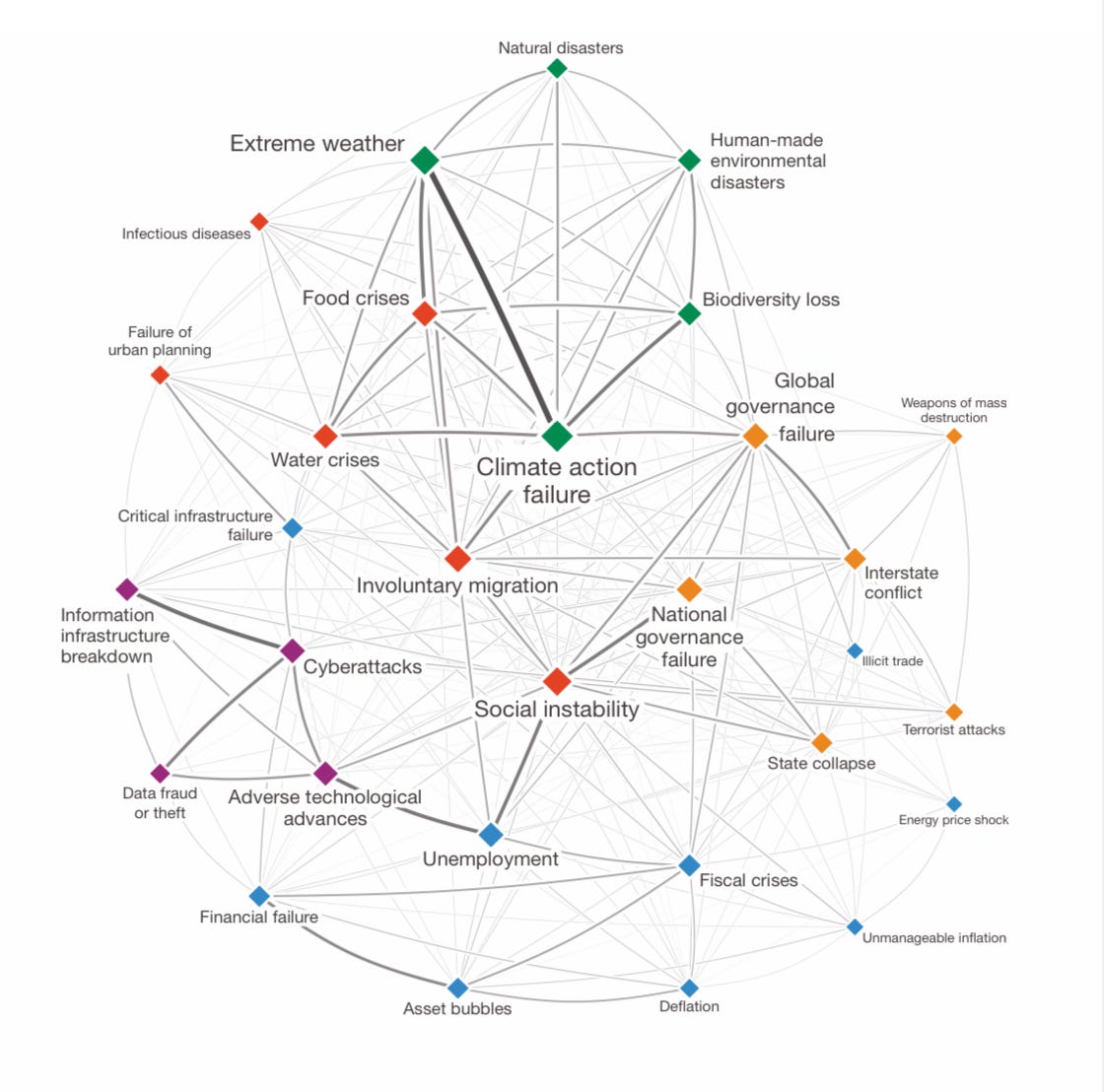
The chart consists of a collection of blobs connected by lines. You are to believe that this demonstrates the significance of interconnection and that “silo thinking” is the root cause of several calamities comparable to the 2008 economic crisis, the Arab Spring, and COVID-19.
SECTION 1.1.2—VELOCITY
“We can see velocity everywhere; whether it’s a crisis, social discontent, technological developments and adoption, geopolitical upheaval, the financial markets, and, of course, the manifestation of infectious diseases—everything now runs on fast-forward.”
When the authors discuss the apparently rapid spread of the COVID-19 pandemic, they lose credibility with velocity. They must have figured out that saying “of course” closes the sale, especially when they have Ernest Hemingway on their side:
“Understanding this growth rate dynamic and the power of exponentials clarifies why velocity is such an issue and why the speed of intervention to curb the rate of growth is so crucial. Ernest Hemingway understood this. In his novel The Sun Also Rises, two characters have the following conversation: “How did you go bankrupt?” Bill asked. “Two ways,” Mike said. “Gradually, then suddenly.”
Then it’s settled. Even though, it is unclear to me if Ernest comprehended why the need of intervening to slow the rate of expansion is vital. Now that he is deceased, we may presume that he would have comprehended this, so let’s proceed accordingly.
In the early months of the pandemic (Q1 and Q2, 2020), governments and the media released infection rates that were based on computer-generated algorithms with no basis in reality. (I was unable to locate these sources from mid-2020.) Schwab leads this challenge with what appears to be a whack-a-mole theory, where the cunning coronavirus suddenly pops up somewhere and then takes off in unpredictable patterns, so it can’t be dealt with properly, overwhelming certain health facilities, and I assume under-whelming others, which could explain the dancing nurses and ’empty hospitals’ reports at the time (mid-2020). Schwab comes to the following conclusion:
“The velocity with which the COVID-19 pandemic surges and the suddenness with which clusters emerge—makes all the difference and renders the comparison with the flu irrelevant.”
Aha. Convenient. It is the execution of the “Big Lie.” Contrary to all known epidemiology, you are expected to trust something that can only be fiction. Simply invent something and conceal any contradictory evidence. It’s Orwell’s 1984: the official story changes overnight, and you’re forced, trained, and conditioned to accept it and cheer the new narrative.
The purpose of this section is to persuade you that the current governance system is incapable of meeting the public’s expectations for rapid action. At no point in this section has this actually been proven. But they want you to believe that the legislative process is incredibly sluggish due to the nasty requirement for legislators to properly analyze all sides of an issue. As if they ever cared about anything and didn’t merely follow Bill Gates’ directions.
“For politicians and business leaders, the need to gain a strategic perspective collides ever more frequently with the day-to-day pressures of immediate decisions, particularly obvious in the context of the pandemic, and reinforced by complexity…”
Luckily, Santa Klaus has a strategic perspective in his bag that will save the day.
SECTION 1.1.3—COMPLEXITY
Complexity is a non-linear system. As a consequence of a butterfly flapping its wings in the tropics, a senile old guy gets elected president, but thanks to the TV series VEEP, we have been prepared to witness a vivacious female vice president stand up to the plate—but I digress.
The aforementioned coronavirus deviations from established epidemiological models are attributed to a non-linear system.
“It is for this reason that pandemic models so often yield wide ranges of outcomes: a difference of assumption regarding just one component of the model can dramatically affect the end result.”
Oddly, the pandemic models that were widely disseminated with a sense of urgency consistently and dramatically exceeded the infection and mortality rates that were eventually disclosed. In a nonlinear system, you may assume that at least one model will underestimate the infection. But this does not appear to have ever occurred, which would indicate that all of these statistics have been falsified since Day 0.
The authors continue their lengthy sermon and finally get to the punch line of their strained analysis:
“The fundamental point here is this: complexity creates limits to our knowledge and understanding of things; it might be that today’s increasing complexity literally overwhelms the capabilities of politicians in particular and decision-makers in general to make well-informed decisions.”
So between the lines, the WEF freely claims to be more intelligent than any politician, which is why it is obviously up to them alone to steer these politicians in the right direction. Where can we find that divine knowledge, then?
“A theoretical physicist turned head of state (President Armen Sarkissian of Armenia), made this point when he coined the expression “quantum politics”, outlining how the classical world of post-Newtonian physics—linear, predictable, and to some extent even deterministic—had given way to the quantum world: highly interconnected and uncertain, incredibly complex and also changing depending on the position of the observer. This expression recalls quantum physics, which explains how everything works and is the best description we have of the nature of the particles that make up matter and the forces with which they interact. The COVID-19 pandemic has laid bare this quantum world.”
The intelligent reader will recognize this to be idiotic. The authors included it to persuade you, using scientific-y arguments, that a significant shift in governance is necessary to address these “incredibly complex” relationships. The final phrase of the preceding quotation is priceless.
SECTION 1.2—ECONOMIC RESET
The chapter is generally concerned with the economic destruction caused by COVID-19. To explain why governments went out of their way to destroy the economy and terrify the populace, dubious data are cited. The writers advocate vaccinations as the answer to the economic crisis, using the opportunity to set the “shaming” ball rolling to stigmatize those who are hesitant.
“… we are collectively as strong as the weakest link, with a high enough compliance rate despite the rise of anti-vaxxers.”
(Yes, “anti-VAXXERS” is a direct quote.)
We also learn the real reason for the lockdowns:
“…the longer lockdowns last, the greater the structural damage they inflict by leaving permanent scars in the economy through job losses, bankruptcies, and capital spending cancellations. As a rule of thumb, every month that large parts of an economy remain closed, annual growth might fall by a further 2 percentage points.”
This circumstance represents a desirable ‘Covid-project’ outcome. The mom-and-pop shops will go. There is nothing like poverty to convert people to your viewpoint. This is the instrument required to enforce conformity in their new reality.
The writers bring up the topic of “degrowth.” There appears to be a manifesto signed by more than 1,100 professionals from around the world:
“Their open letter calls for the adoption of a democratically planned yet adaptive, sustainable, and equitable downscaling of the economy, leading to a future where we can live better with less.”
Wow. Better living with less… where have we heard that before? Oh yes, the notorious article “You will own nothing and be happy,” that does not reflect the WEF’s opinion and is a conspiracy theory.
It resembles Newspeak (ref. “1984”). This is consistent with the tiny home trend. And I wonder, are billionaires today living with less wealth? Not since I last checked. In just 10 months, the wealth of billionaires has surged by 40 percent, according to the general consensus. This one truth kills the entire book from its spine outwards, and we could actually stop reading it now because the authors led themselves into absurdity.
But wait, they go on with this:
“In systemically important countries, central banks decided almost immediately after the beginning of the outbreak to cut interest rates while launching large quantitative- easing programs, committing to print the money to keep the costs of government borrowing low. The US Fed undertook to buy Treasury bonds …”
If these gentlemen want to bring up the US Federal Reserve and government borrowing, I suppose we might explore it in further depth…
It’s a stretch to call this money printing because there is a borrowing cost here. The Treasury pays interest (it could be low—it depends on the bid at the time of the original sale of the bond) to whoever holds the Treasury bond. The US Fed is privately owned by private banks, who earn interest on the bonds they buy. The US Fed creates the money to buy the bond by ledger entry. The Treasury gets the money to pay that interest (and eventually the principal) through fees and taxes on the public, or from sales of assets it holds. This is borrowing money for the Treasury, not printing money. If the Treasury were to create the money themselves (use their own ledger), that would be printing money, and there would be no interest to pay. The US Fed would have to be taken out of the loop for that to occur.
The authors continue with a discussion about Helicopter Money (from the Treasury). Helicopter Money achieves at least two objectives for the Great Reset project management: It maintains tranquility among the newly unemployed while the economy is being strangled. This is essential as you don’t want actual food riots and other types of civil disobedience, while the initiative is in its infancy. The other benefit of Helicopter Money’s inflationary pressure is that it robs the wealthy (not the super-rich) of their riches. The real value of their GICs and bonds will decrease. Consequently, the intended social consequence of a more cooperative (poor) citizen is advanced.
SECTION 1.3 SOCIETAL RESET
“… the societal upheaval unleashed by COVID-19 will last for years, and possibly generations. The most immediate and visible impact is that many governments will be taken to task, with a lot of anger directed at those policy-makers and political figures that have appeared inadequate or ill-prepared in terms of their response to dealing with COVID-19.”
Henry Kissinger (how is he even still alive?) is allowed to puke some wisdom as well:
“Nations cohere and flourish on the belief that their institutions can foresee calamity, arrest its impact and restore stability. When the COVID-19 pandemic is over, many countries’ institutions will be perceived as having failed.”
The message is that we have no alternatives. The old has been replaced with the new. COVID-19 has demonstrated conclusively that the previous system cannot effectively manage a simulated crisis. We need stronger hands to steer us through the more difficult future of even more manufactured crises. Obviously, this will require sacrifices, but how many more faux crises can we endure before the ineffectual old structure collapses, bringing us all down with it?
A list of correct characteristics exhibited by countries that fared better during the fictitious pandemic is provided:
- they were prepared (logistically and organizationally) for what was to come
- they made prompt and decisive decisions
- they have a cost-effective and inclusive health system
- they have high trust societies in which citizens have confidence in both the leadership and the information they provide
- they appear compelled to demonstrate a genuine sense of solidarity, prioritizing the common good over individual aspirations and needs.
These characteristics are consistent with a well-cared for flock of sheep; thus I can see this being a Great Reset objective.
SECTION 1.3.2—SOCIAL UNREST
So White people, unless you want to see fictitious race warfare, you should join the new global order.
SECTION 1.3.3—THE RETURN OF BIG GOVERNMENT
“Rather than simply fixing market failures when they arise, they should, as suggested by the economist Mariana Mazzucato: ‘move towards actively shaping and creating markets that deliver sustainable and inclusive growth.”
Sounds like a re-introduction of Mercantilism. The New Deal enacted by FDR in the 1930s is used as an example of how rapidly regulations may be rewritten and government enlarged if conditions are favorable for change. However, the authors avoid mentioning that the New Deal was a complete disaster. They must have forgotten.
SECTION 1.3.4—THE SOCIAL CONTRACT
”…growing concern that the fight against this pandemic and future ones will lead to the creation of permanent surveillance societies.”
Don’t get too optimistic, the WEF doesn’t actually see this as a problem. Preparing for a counterattack against these dangerous right-wing conspiracy theorists who disagree with the necessity of a surveillance society, the authors wrote:
“…suffice it to say that a state emergency can only be justified when a threat is public, universal, and existential.
As previously mentioned, these WEF writers concede many times in their article that the coronavirus pandemic is not existential; hence, the stipulated prerequisites for a state of emergency have not been reached. But I assume the count on you having already forgotten what they wrote 15 pages before.
A summary of how millennials and GenZ are worse off than their parents under a failing system is provided. However, this is an ongoing issue. It was a problem long before anyone had heard of coronavirus; thus it has nothing to do with COVID-19. It is presented as a COVID-19 problem in order to gain support from that demographic and to prepare the stage for the anticipated civil unrest events.
SECTION 1.4—GEOPOLITICAL RESET
Then, though, something caught my attention: regionalization!
“The most likely outcome along the globalization-no globalization continuum lies in an in-between solution: regionalization. The success of the European Union as a free trade area or the new Region’s Comprehensive Economic Partnership in Asia (a proposed free trade agreement among the 10 countries that compose ASEAN) are important illustrative cases of how regionalization may well become a new watered-down version of globalism.”
Oceania, Eurasia, and East Asia would be the names I would propose for the three areas. Throughout their essay, 1984 possibilities appear to be looming in the background. They are shamelessly selling you authoritarianism and self-sacrifice, but neglect to inform you of any benefits for yourself beyond the altruistic glow that comes from you aiding billionaires.
SECTION 1.4.2 GLOBAL GOVERNANCE
The world’s governors may wish to cut administrative costs. A populace that has been dumbed down and confused would not require as many political diversions as is presently available. Consequently, I believe that the cost of propaganda would decline.
SECTION 1.4.3—THE [MANUFACTURED] GROWING RIVALRY BETWEEN CHINA AND THE US
“In the post-pandemic era, COVID-19 might be remembered as the turning point that ushered in a new type of Cold War between China and the US.”
In other words, one big fake ushering in another. All so that you can more easily strive in the joy of tyranny.
SECTION 1.4.4—FRAGILE AND FAILING STATES
At this point, The Great Reset essay resembles a shooting gallery at a carnival. The writers toss up a number of concerns (environment, etc.), attributing each one in some manner to being irreversibly transformed by the feared coronavirus and necessitating significant structural adjustments in governance. Therefore, you shoot down the false scenarios, statistics, and everything else. This quickly becomes tedious. The only significance is determining where they intend to push you, so let’s quickly look at this, as I have discussed a lot of it in other articles already:
- Environmental Reset—UN Agenda 2030
- Technological Reset —more robots, surveillance, tracking
- Micro Trends —work from home, telemedicine
- Industry Reset —small business goes bankrupt, reduced travel, online everything
- Redefining our humanness —don’t listen to “theorists”
- Mental health and well-being —men will beat their wives, Men-are-pigs, split the sexes
- Changing Priorities—live better with less
All as a form of control, in order to prevent any meaningful thought and response. Declawing any remaining possibility of revolution.
SECTION—CONCLUSION
“We do not want to be that village. To avoid such a fate, without delay we need to set in motion the Great Reset. This is not a “nice-to-have” but an absolute necessity.”
I have an issue with analysts who employ fictional literature to illustrate real-world applications. Someone fabricated the village tale. Why should we think that it is representative of reality? Based on this, their call to action is beyond irresponsible. They are just relying on prior functions to support the present one. It’s as if I told you to look at Star Wars to learn how to take down a tyrannical empire.
George Floyd reappears in an effort to convince you to support The Great Reset. And if you didn’t catch it before, the authors offer you one final opportunity to realize that the world is being duped.
“The Corona pandemic is different (than the Black Death). It does not constitute an existential threat, or a shock that will leave its imprint on the world’s population for decades.”
YEAH, WE GOT IT! In other words, we are compelled to extend our hand to you one more time in the name of cosmic justice, so that when you are enslaved, you will only have yourself to blame.
As expected, the book is badly written and argued, serving as a very obvious template for dictatorship and fascism. Schwab appears to be so isolated from the actual world that he feels no need to pretend he is not doing what he is doing or is not who he seems to be. At first impression, he resembles an evil tyrant, and he is okay with it. The book does nothing to diminish this initial impression. This is not Roosevelt nor Truman posing as a populist. This is Dr. Evil, twisting his mustache and caressing his white, fluffy kitten. He has such a low opinion of your knowledge and courage that he doesn’t even hire talented writers to lie to you. He recruits the typical slackers from subbasement levels, who should be working in advertising and not for Intel, and they hurry to produce the requisite “book” as an afterthought.
Books remain on the propagandist to-do list, even though no one reads them anymore. Since everyone intelligent enough to read a book is also intelligent enough to see through this, they should really refrain from writing books entirely.


